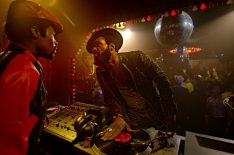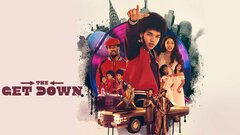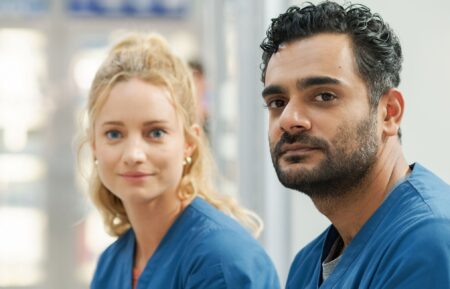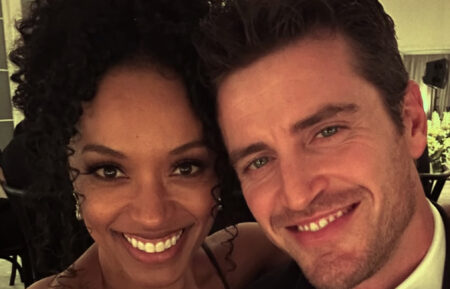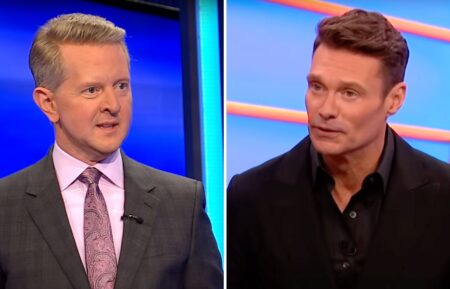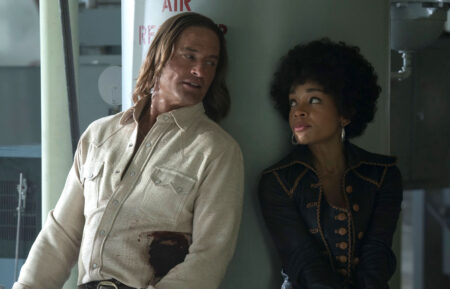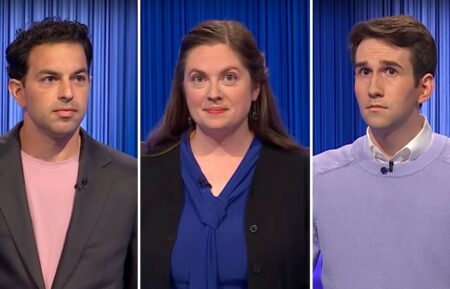‘The Get Down’ Part II: Justice Smith Reveals What’s Next for The Get Down Brothers, Zeke and Mylene
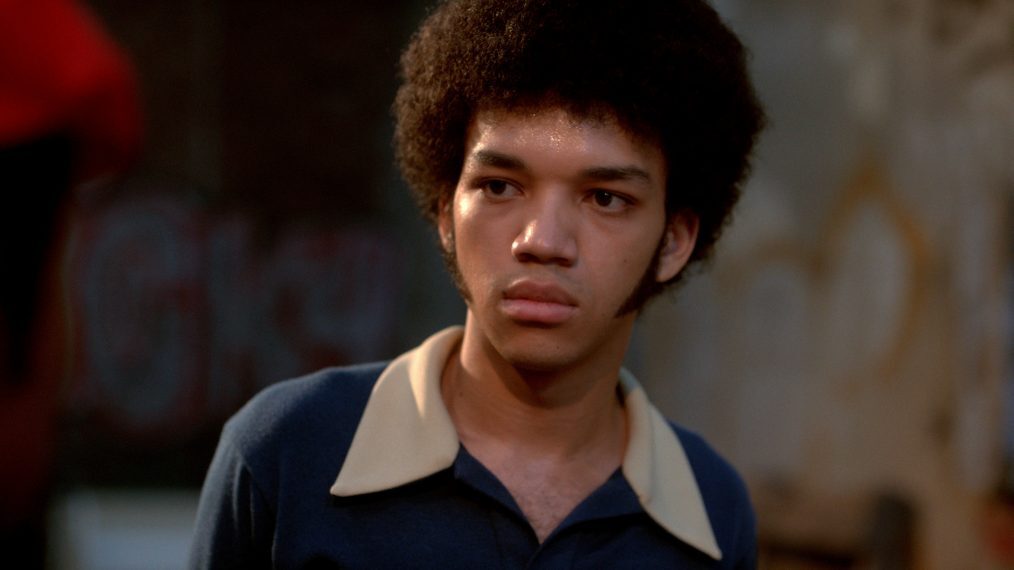
Relative newcomer Justice Smith plays one of the fiercest rappers during the 1970s hip-hop revolution in Netflix’s ambitious series The Get Down. The Baz Luhrmann spectacle set in the Bronx, New York, returns with Part II on April 7, concluding the six episodes that premiered in summer 2016. Part I of the series ended with Smith’s Ezekiel pursuing his hip-hop aspirations while in conflict with his love for neighborhood girl and rising disco star Mylene.
Will Zeke choose love over fame? What does Part II have in store for Zeke’s crew, The Get Down Brothers, including the charismatic Shaolin Fantastic? Smith gives TV Insider a sneak peek as to what fans can expect from the as-yet-unrenewed The Get Down.
This isn’t you first role, but it’s definitely your first lead role. Has it been a crazy ride so far?
It’s been intense, it’s been crazy. I don’t know what else to say about it. I’m happy it’s connecting with a lot different people and this past year has been very luxurious. [Laughs] But it’s a little weird ’cause I feel like the same person as I was like two years ago, three years ago. But, everyone is just treating me different so I’m just kind of getting adjusted to that.
Did you have any hip-hop or music experience before this or was this your first time really getting your feet wet with it?
I did not have any hip-hop experience or knowledge before this. Everyone knows one rap song that they can rhyme along to when it comes on the radio. But I definitely didn’t know what to do to the extent that I know it now. I definitely didn’t know where it came from or what started it or who were the pioneers—I didn’t know any of that. And I’m kind of ashamed of how much I did not know or like there’s certain 70s rappers and hip-hop pioneers that it’s astonishing to me that more people don’t recognize or acknowledge.
Daveed Diggs plays the role of adult Ezekiel, while Nas provides the vocals for his raps. These are two prominent rappers in the game right now. Did you listen to anyone specific to prepare for the role?
When I first booked the show I filled my Spotify with only hip-hop music and then, more specifically, 70s hip-hop music or early 80s hip-hop music, because I not only had to be introduced to this culture as a whole but I had to focus on the subset. I worked with Kurtis Blow and Rahiem from the Furious Five and they basically told us that we had to unlearn everything we knew about modern-day hip-hop and cadence and how rappers rap today because it’s completely different. Just like how there’s different melodies and the content is different. So, that was an intense experience, but at the same time while my character being introduced to this world, I was kind of being introduced to this world so it kind of worked out for the better.
You’re from L.A. and you got to be in New York for filming. Did you visit the Bronx before and what did you learn about it?
So we had basically a month of preparation where we were basically in boot camp where Shameik [Moore] was working with Grandmaster Flash on learning how to DJ. I was learning with Kurtis Blow on how to MC. We had dialect training. We were watching documentaries and reading books, very much immersing ourselves in the culture and in the time period and in the environment. Also, Kurtis Blow took us on a tour around South Bronx and showed us all the historical hip-hop sights. Like, 1520 Sedgwick Avenue where DJ Kool Herc used to have his parties. So yeah, we did tour around that area as well as doing extensive research about the show and our characters and stuff.
Working with Baz Lurhman must’ve been incredible. Had you seen some of his stuff before and how was that experience working with him?
I mean, I had seen Baz’s work. I’ve seen Moulin Rouge; I love that film. I saw Romeo + Juliet, The Great Gatsby. Right as I first started auditioning for The Get Down, I watched one of his first films Strictly Ballroom, which is really cool. I mean, he was one of the main reasons why I was so excited to do it and why I felt like I should take the risk and try to play this character that I never really had the experience playing before. And, I mean, it all worked out for the better. He’s an artist and I think that’s why I connected with him, because in this industry it’s really easy to get sucked in by all these business aspects and how much money you’re making and how famous you are and all these kinds of stuff. And, when I met him, it was really about telling this story and putting together a piece of art. And that’s like how I like to approach my work so I was really grateful for that. Working with him was a dream.
Zeke seems to be at a crossroads at the end of Part I. Without giving too much away, what can you say about these different decisions that he’ll be making in Part II?
I’m not sure how much I can give away but The Get Down Brothers become more successful and start selling out venues and making more money and that encourages Zeke to be more confident in his music and his professional path. But he’s still [trying to] appease everybody so he’s trying to keep his relationship afloat while also making his aunt and his teacher proud by staying with this internship and trying to create a future for himself or, at least, plant the seeds for a future that his aunt would want for him. But he’s becoming better at that. Better at balancing all those different relationships and all those different paths. But he’s still not necessarily listening to what he wants to do, listening to his inner voice, so it kind of blows up in his face.
Part II takes place one year after Part I and a lot can happen in one year. Is there a growth that we’ll see in Ezekiel right away?
He’s definitely grown into his skin a little more and he’s more adapt to managing these different relationships. And he becomes a little cockier, which is—I actually learned from Kurtis Blow—actually a good thing in the hip-hop world, especially when you’re an MC. A lot of it is about ego, especially when you’re performing. It’s essentially peacocking and hyping yourself up while putting the other person down when you’re in a rap battle. He becomes a little more confident and a little more cockier with his music and his life and so that’s what I would say is the growth over the year.
We know where future Ezekiel ends up by The Get Down Brothers aren’t with him. Does this give us a clue as to what happens in Part II?
Honestly, I don’t really know what the writers plan is for future Zeke or what’s actually occurred. I think there are some hints to it in Part II but you just have to watch to find out. [Laughs]
The Get Down hasn’t been renewed for season two yet, but there are talks that it will include a flash-forward to the 80s. How much do you know about hip-hop culture in the 80s and what do you hope to see happens for Ezekiel and the rest of the crew knowing what happens in Part II?
I don’t really know anything about the 80s besides weird haircuts and Rock and Roll. I guess, just like the 70s, I’m gonna have to do a whole lot of research. I hope that The Get Down Brothers kind of get to continue to pursue their music or at least Zeke follows his voice a little more. I would love for these characters to continue on. But, if not, I feel like we made something great and specific and something that’s never been done before so that’s all I can kind of ask for.
What else is going on in the future? I know you’re currently filming or will start filming Jurassic World 2, but how it that experience like and is there anything else we should be excited for?
I just finished doing a play that I was really proud of called Yen by Anna Jordan, where I played like a fourteen-year-old from West London with Turrets [Syndrome] and ADHD so that was really cool. And I’m currently shooting the second Jurassic World movie, which is a lot of fun. It’s very, very technical. But it’s an experience I know I can grow from and learn from and all that good stuff.
The Get Down Part II, Streaming, Netflix

